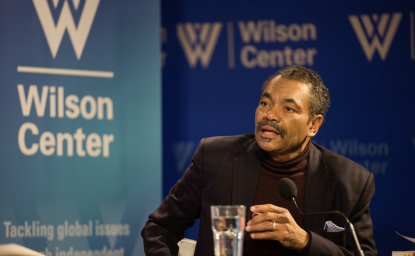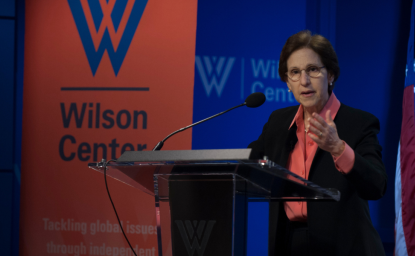
A blog of the Wilson Center
Q: Your book Versailles: Das Wagnis eines demokratischen Friedens 1919-1923 (Versailles: The Dare of a Democratic Peace 1919-1923) was recently published. Can you tell the Wilson Center audience how you brought it to life and what you hope readers take away from it?
A: The publication date of my last book was chosen to commerate the 100th anniversary of the signing of the Versailles Treaty on June 28, 1919. For me personally, this is the final product of my decades long scholarly preoccupation with the problems of peacemaking after World War I. In English this resulted in a book published by the University of North Carolina Press in 1985, a revised translation of the German text that came out in 1972. The focus of my interest has always been the role president Woodrow Wilson assumed in the attempt to place a defeated Germany into the new international order negotiated by the victors at the Paris Peace Conference. My present book tries further to incorporate the multilateral aspects of this process. In studying my book, the reader is confronted with the problems that arose from trying to create a lasting international order that transcended the hatreds inherited from the war.
The major point I am trying to make in my narrative is the dichotomy - the contradiction - that came up between the aims of a "democratic" peace, on the one hand, and the parliamentary process in sanctioning them, on the other. In public opinion as well as in all parliaments of those days, right wing forces exercised strong pressure in trying to attain a victor's peace based on power, enhanced by stringent terms, and enforced by military predominance. It was the contradiction between a democratic peace as a lofty aim in international relations and the result of democratic processes in the countries in question that had led to strong "imperialist" minorities, if not majorities. It is the very problem of the kind of populism we have to cope with today. In this sense, I hope, my book will contribute to today's political discourse and foreign policy orientation.
Q: What do you mean by Versailles as democratic peace and what role does this play in Germany today?
A: The term "democratic peace" was rarely used in 1919. Instead, Wilson spoke of a liberal or progressive peace. But, what he and his millions of adherents all over the world meant, amounts to the same of what I call "democratic peace". In my account, this term has a two-fold meaning: It deals with the process of peacemaking in democratic societies based on parliamentary proceedings; it also covers the aims of that peace process, above all self-determination and "justice" in a way that its terms would satisfy both the victors and the defeated powers. Needless to add, as a result of interallied compromises accepted during the peace conference, these objectives could be attained only in part. Wilson's idealistic stance was adopted by the United Nations only as a result of World War II. West Germany was then incorporated in the new peaceful order. Today, its ideals are the guiding principles of Germany'a foreign policy - presently defending them against the onslaught of nationlistic populism on both sides of the Atlantic.
Q: What was Wilson's role at Versaille and how did you explore this in your book?
A: The above underlines the dominating part Wilson played in enunciating these ideals and in trying to implement them during the Peace Conference internationally, and afterwards at home. His allies tried to water them down, but rarely dared to challenge them in principle. Germany attempted to use them as a means to attain a lenient peace.
Q: What’s next for you? Do you have any upcoming plans or projects you can tell us about?
A: My next plan is to contribute to the history of European integration by publishing an abbreviated and updated version of my biography of Jean Monnet, first published in 2016. After that, I may return to the discussion of some major historic trends in America's foreign policy.
Author
Professor Emeritus of Contemporary History, Historische Institut, University of Technology at Aachen, Germany.
Explore More in Scholar & Alumni Spotlight
Browse Scholar & Alumni Spotlight
Olufemi Vaughan: Shaping Governance Through Scholarship and Dialogue

Dr. Maurice Jackson: The Sounds of Resistance Throughout History

